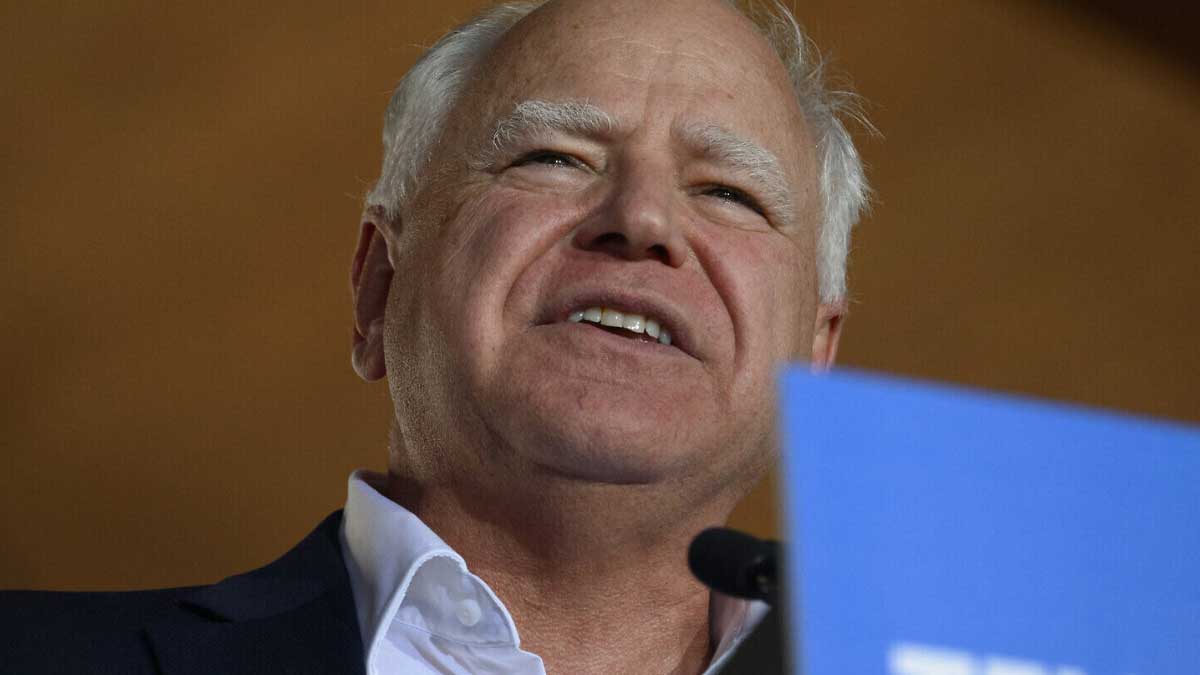- Home
- Billionaires
- Investing Newsletters
- 193CC 1000
- Article Layout 2
- Article Layout 3
- Article Layout 4
- Article Layout 5
- Article Layout 6
- Article Layout 7
- Article Layout 8
- Article Layout 9
- Article Layout 10
- Article Layout 11
- Article Layout 12
- Article Layout 13
- Article Layout 14
- Article Sidebar
- Post Format
- pages
- Archive Layouts
- Post Gallery
- Post Video Background
- Post Review
- Sponsored Post
- Leadership
- Business
- Money
- Small Business
- Innovation
- Shop
Recent Posts
Upcoming VP Debate: Vance and Walz Face Off

Next week marks a significant moment in the 2024 presidential campaign as Republican vice presidential nominee, Senator JD Vance of Ohio, and Democratic candidate, Minnesota Governor Tim Walz, prepare for their much-anticipated debate. Scheduled for October 1 at 9 p.m. ET, this event could be the final opportunity for both candidates to present their platforms to the nation before the election. Since being selected as vice presidential nominees earlier this summer, Vance and Walz have both gained national prominence, largely due to their rigorous campaigning schedules. As the race intensifies, their debate will serve as a crucial platform for them to showcase their visions and appeal to undecided voters.
The upcoming vice presidential debate will air live on CBS News, with coverage available on all local CBS affiliates. Major news networks will also simulcast the event, ensuring that it reaches a broad audience. Viewers can find streaming options on the websites of these networks, making it accessible to those who prefer to watch online. The debate will be moderated by two prominent journalists: Norah O’Donnell, anchor of “CBS Evening News,” and Margaret Brennan, the moderator of “Face the Nation” and CBS’s chief foreign affairs correspondent. Their experience and reputation for journalistic integrity will lend credibility to the proceedings, allowing for an informative exchange between the candidates.
While the specific rules for the debate have yet to be confirmed, it is anticipated that they may mirror the regulations employed in previous presidential debates. These could include the muting of candidates’ microphones when they are not speaking and the absence of a live audience to ensure a focused discussion. Such measures aim to facilitate a fair exchange of ideas and limit interruptions during the debate. As of now, there has been no public announcement regarding the possibility of a second debate between Vance and Walz. The lack of communication on this front raises questions about how much further both candidates will engage with each other before the election. Similarly, speculation surrounds the potential for additional faceoffs between Donald Trump and Kamala Harris. Harris challenged Trump to a rematch after their first debate earlier this month, but Trump has dismissed the idea, asserting that Harris seeks another opportunity only because he “won” the initial encounter.
Recent polling data provides insight into how Americans view both candidates. A September Pew Research survey reveals that Tim Walz has a slight edge in favorability, with 39% of respondents viewing him positively compared to 34% for Vance. Furthermore, when asked about their qualifications to assume the presidency if necessary, more Americans deemed Walz qualified (35%) than Vance (30%). These statistics reflect the ongoing competition for public support as both candidates prepare for the debate. Senator Vance, a former Marine and Iraq war veteran, is likely to leverage criticism of Governor Walz’s military service during the debate. Since Walz entered the race, Vance has accused him of “stolen valor,” referencing allegations that Walz left the National Guard to avoid being deployed to Iraq. While some fellow guardsmen have made these claims, others have defended Walz, asserting that he had planned to retire well before his unit’s deployment was announced. In addition, Vance and his allies have used derogatory nicknames, such as “Tampon Tim,” aimed at Walz’s advocacy for policies ensuring access to menstrual products in schools. This tactic underscores the intense partisan divide and character-driven campaigns leading up to the election.
On the other hand, Governor Walz is poised to challenge Vance on several fronts, particularly given the controversies that have surrounded him since joining Trump’s ticket. Vance’s previous comments regarding “childless cat ladies” in the Democratic Party have resurfaced, drawing public scrutiny. He has also faced backlash for his role in amplifying baseless claims about Haitian migrants in Springfield, Ohio, leading to heightened tensions in the community. Throughout the summer, Walz has branded both Vance and Trump as “weird,” a phrase that has resonated among Democratic voters. Furthermore, Walz and his campaign have pointed out Vance’s controversial stance on abortion, highlighting his past support for making the procedure illegal nationwide as Trump and Vance attempt to navigate public perceptions.
Both candidates entered the national political scene relatively recently. Vance was first elected to public office during the 2022 midterm elections, while Walz remained largely unknown to voters until he joined Harris’s ticket. Trump selected Vance as his running mate in July at the outset of the Republican National Convention. Shortly thereafter, Harris appointed Walz, following President Joe Biden’s withdrawal from the race. Their midwestern backgrounds and relatively new presence in the national arena position both candidates as fresh faces in the campaign, seeking to connect with voters in a rapidly changing political landscape. As the debate approaches, all eyes will be on Vance and Walz as they seek to solidify their platforms and appeal to the American electorate. The outcomes of their exchanges could have lasting implications for the 2024 presidential race, making this debate a pivotal moment in the campaign.
Recent Posts
Categories
- 193cc Digital Assets2
- 5G1
- Aerospace & Defense46
- AI37
- Arts3
- Banking & Insurance11
- Big Data3
- Billionaires462
- Boats & Planes1
- Business328
- Careers13
- Cars & Bikes76
- CEO Network1
- CFO Network17
- CHRO Network1
- CIO Network1
- Cloud10
- CMO Network18
- Commercial Real Estate7
- Consultant1
- Consumer Tech180
- CxO1
- Cybersecurity68
- Dining1
- Diversity, Equity & Inclusion4
- Education7
- Energy8
- Enterprise Tech29
- Events11
- Fintech1
- Food & Drink2
- Franchises1
- Freelance1
- Future Of Work2
- Games141
- GIG1
- Healthcare78
- Hollywood & Entertainment186
- Houses1
- Innovation42
- Investing2
- Investing Newsletters4
- Leadership65
- Lifestyle11
- Manufacturing1
- Markets20
- Media193
- Mobile phone1
- Money13
- Personal Finance2
- Policy567
- Real Estate1
- Research6
- Retail1
- Retirement1
- Small Business1
- SportsMoney33
- Style & Beauty1
- Success Income1
- Taxes2
- Travel10
- Uncategorized8
- Vices1
- Watches & Jewelry2
- world's billionaires431
Related Articles
Trump Moves $4B Stake in Truth Social Parent, Stock Drops 6%
Donald Trump recently transferred his 57% stake in Trump Media & Technology...
By 193cc Agency CouncilDecember 20, 2024House Rejects Trump-Backed Funding Bill, Shutdown Looms
The U.S. House of Representatives rejected a new government funding bill on...
By 193cc Agency CouncilDecember 20, 2024Trump Named Time’s Person of the Year for Second Time
On Thursday, Time magazine honored Donald Trump as its “Person of the...
By 193cc Agency CouncilDecember 12, 2024Meta Donates $1 Million to Trump’s Inaugural Fund
Meta, the parent company of Facebook and Instagram, has confirmed a $1...
By 193cc Agency CouncilDecember 12, 2024















Leave a comment